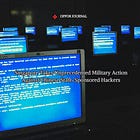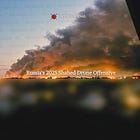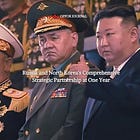Progress Report and Thinking About The Future
Hi, this is Dan White. This will be a bit of a different post, but one I think that is overdue. It’s been three months since I first conceived the idea for OPFOR Journal and I want to trace a line from where this project began to where it is heading in months to come.
First, let me start with an overdue thank you.
I am incredibly grateful for the immense support I have received for this project in the past three months. I treasure the words of encouragement I have received from many of you in conversations, phone calls, texts, emails, and comments. I really appreciate everyone who has taken the time to collaborate and indulge my many questions.
Finally, thank YOU for subscribing and reading. There are many more people who now subscribe than I know personally, and I thought it might be a good time to reintroduce myself and this project.
Origin of the Project
Why Does OPFOR Journal Exist?
I launched OPFOR Journal in May, shortly after losing my position at the Woodrow Wilson International Center for Scholars, which was effectively shuttered in April due to executive orders reducing the federal workforce.
Beyond the obvious concern I felt about having lost my job, I was also concerned about the direction the country appeared to be heading. America seemed to be turning inward and shunning foreign policy expertise at a time of growing danger.
I believed in the rigorous, non-partisan foreign policy work the Wilson Center had done, and I wanted to ensure that a part of it would survive and evolve. This project attempts to keep the Wilson Center's spirit alive while creating a new space for non-partisan conversations and research focused on America's most pressing adversaries: China, Russia, Iran, and North Korea. Through this work, I hope to keep Americans engaged in foreign policy issues, combat isolationism, and defend the best aspects of America's global leadership.
Why Only China, Russia, Iran, and North Korea?
I chose to focus this project narrowly on China, Russia, Iran, and North Korea, as these nations pose escalating and increasingly coordinated threats to the US and its allies. From my research on Russian national security policy and grand strategy at the Wilson Center's Kennan Institute, I observed how the individual threats posed by each of these countries were rapidly merging in the aftermath of Russia’s invasion of Ukraine.
Why the Name?
The name came from the simplest definition. The strategic partnerships between China, Russia, Iran, and North Korea has been variously called the “Axis of Upheaval,” the “Axis of Anger,” the “Axis of Aggression,” “CRINK,” “Fortress Eurasia,” and more. These names are all fine but tend to bury the lead. The essential essence of cooperation between all four countries is not a shared vision of the future but mutual interest in opposing the US and the US-led international order. Thus the military term opposing forces, commonly abbreviated as “OPFOR,” seems to be the most fitting name for the grouping.
Key Activities
The mission of this project is to document, analyze, and anticipate threats from the OPFOR to help America and its allies understand how to adapt and overcome them.
This is an aspirational mission, which I hope OPFOR Journal will grow into overtime.
Documenting - Conducting interviews with key actors and eyewitnesses. Investigating documents and open source media to uncover important new information.
Analyzing - Publishing well-researched analytical briefs and interviews with experts.
Anticipating - Identifying and ranking scenarios of potential actions by the OPFOR. Creating forecasts using a combination of expertise as well as structured analytical frameworks and models.
Key Focus Areas
This journal is about power. OPFOR Journal documents, analyzes, and anticipates how America’s adversaries build power, how they use it, and the threat it poses to our interests at home and abroad.
Articles will generally focus on the traditional instruments of national power: Diplomatic, Informational, Military, and Economic. However, any subject that significantly impacts the OPFOR’s comprehensive power is of interest.
Future of the Project
At present OPFOR Journal publishes a Weekly Significant Activity Report covering the most important events involving the OPFOR each week and periodic Situation Reports analyzing specific major issues. Typically this amounts to one to two posts per week, the max I manage as a team of one.
This program has worked well so far, but I believe it should evolve into something new and better over time.
Short-Term Goals
More interviews, collaboration pieces, and guest articles - The only way to do justice to the breadth and depth of the subject matter is to elevate the opinions of experts. I would like to feature a combination of emerging and established foreign policy experts and policymakers.
Experiments with formats and designs - OPFOR Journal publications will be continuously refined through a combination of incremental changes and bold experiments. Some changes will work. Some won’t. We will keep the former and learn from the latter.
Long-Term Goals
Grow the team - Right now OPFOR Journal is a one-person show. It is a passion project. But I would like to see it grow and take on a life of its own.
Modeling and testing assumptions - It is impossible to actually predict the future with certainty. However, the point of analysis is to structure thinking to understand possible futures and the likelihood of each coming to pass. We are at an inflection point in the foreign policy community where technology is opening new ways of conducting research and modeling assumptions.
The proliferation of computers in the 20th Century enabled advanced statistical modeling which allowed economics to reshape political science and international relations into rigorous disciplines. The evolution of artificial intelligence is now improving the ability to model complex datasets, democratizing the process, and making results more intuitive. I believe this technological progression will open new possibilities not only for collecting and analyzing open source information but also for making sense of it through the construction of simulations and war games that can be used to test ideas.
My goal over the long term is to make OPFOR Journal an early testing ground for simulation-based policy research and to provide experts with the means of evaluating their assumptions, identifying important variables, tail risks, and unknowns. I hope to also use war gaming focused on China, Russia, Iran, and North Korea as a means of building community.
Thanks for reading and being an early supporter of OPFOR Journal. Please feel free to reach out at any time by email or direct message. I would love to hear from you.
If you are new here, please check out other recent OPFOR Journal articles:
Finally, if you haven’t already, click the subscribe button below to never miss an update








Dan I just found you and apparently at a good time. You talked about using wargaming. Have you heard of Sebastian Bae? Sebastian created the widely used Littoral Commander and its variants. He travels around quite a bit but he's a great guy. If you don't know him I could reach out to him for you over at Bluesky. We've talked back and forth quite a bit and he's been and encouragement in my brothers own game development. Let me know. Respectfully, Michael Barr